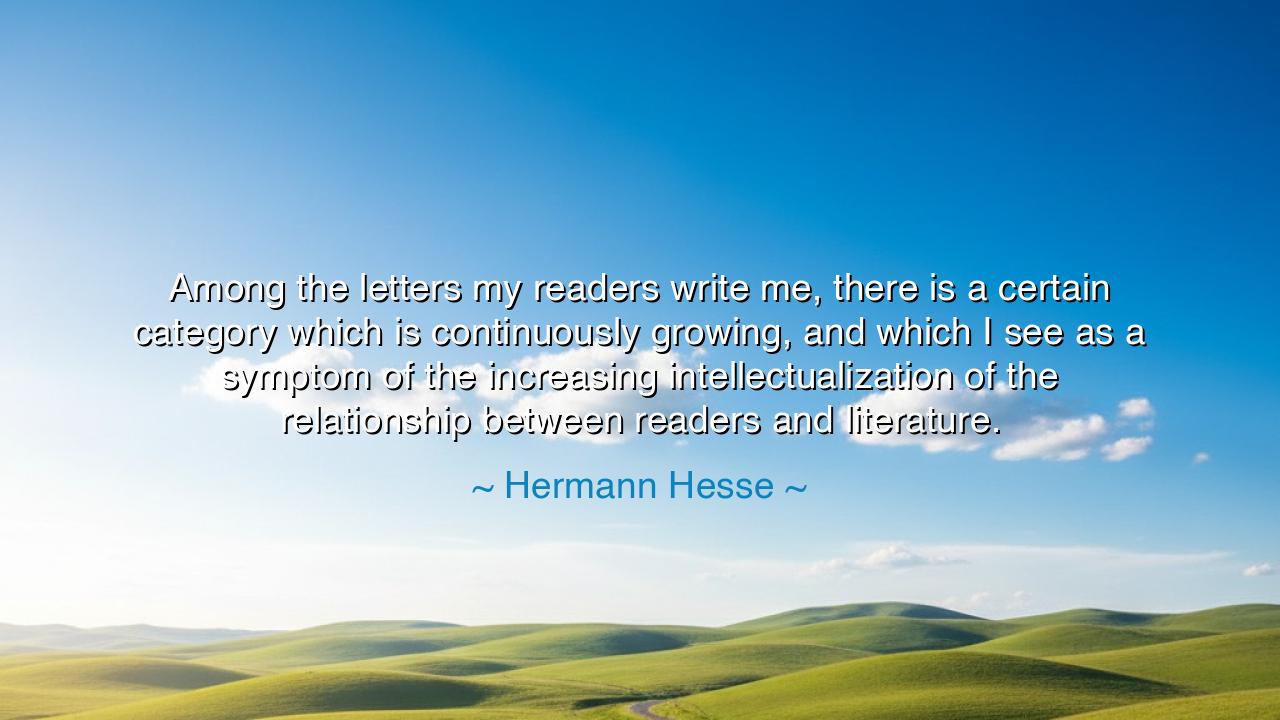
Among the letters my readers write me, there is a certain
Among the letters my readers write me, there is a certain category which is continuously growing, and which I see as a symptom of the increasing intellectualization of the relationship between readers and literature.






In the thoughtful words of Hermann Hesse, “Among the letters my readers write me, there is a certain category which is continuously growing, and which I see as a symptom of the increasing intellectualization of the relationship between readers and literature,” there lies a reflection on the shifting bond between the soul and the written word. Hesse speaks as one who has watched the growth of a subtle change: where once literature spoke directly to the heart, stirring emotion and wonder, now the mind seeks to dissect and analyze. This transformation, though born of curiosity, risks turning the living spirit of art into a lifeless puzzle of ideas.
The origin of this truth stretches back to the ancient storytellers and poets. In the earliest days, tales were sung beside the fire, and listeners received them with awe, allowing their souls to be shaped by myth and meaning. But as societies advanced, schools of thought arose, and people began to approach stories not merely as vessels of wisdom, but as subjects for critique. In this way, the relationship between the teller and the listener—or the writer and the reader—grew ever more intellectualized, at times enriching understanding, but at other times building walls between the heart and the text.
When Hesse observes the growing category of letters, he speaks of this very phenomenon. His readers, rather than losing themselves fully in the beauty of a tale, now seek to analyze motives, symbols, and philosophies. While there is value in such exploration, there is also danger. For when the mind alone engages, and the heart remains silent, literature ceases to breathe. It becomes a subject to master, rather than a companion to love and be transformed by.
Thus, these words are both a warning and a call to balance. Let the intellect serve as a lantern, illuminating hidden meanings, but let it never extinguish the raw flame of feeling. A true relationship with literature is not built only on thought, but on surrender—allowing the words to move the spirit as deeply as they challenge the mind. In this harmony, the reader and the writer remain bound together, not in cold analysis, but in the timeless dance of imagination, emotion, and understanding.






BTBui Thuong
Hermann Hesse's observation on the intellectualization of literature prompts an interesting reflection on how our relationship with books has changed. Is this intellectual approach to literature really enhancing our understanding, or is it distancing us from the raw emotions and personal connections we once formed with books? How can we ensure that reading remains an experience that touches us deeply, rather than just an academic exercise?
LLinh
Hesse's comment about the intellectualization of literature seems to be highlighting a shift in how we interact with books. Is this trend a result of the increasing pressure to analyze and critique everything, especially in academic circles? What would happen if we returned to simply enjoying literature without overanalyzing it? Could we lose something essential in the process of dissecting every nuance of a text?
LDHuong Lan Doan
Hesse’s thoughts on the increasing intellectualization of literature present a fascinating challenge. In a time when everyone seems to be dissecting every word, line, and plot point, do we risk forgetting that literature is meant to be a source of emotional connection? Could this intellectual approach cause us to lose sight of the personal, transformative power of reading that doesn’t require analysis, just emotional engagement?
NHNgoc Hoang
Hermann Hesse's observation on the intellectualization of reading makes me wonder whether books are still being read for enjoyment, or if they have become puzzles to solve. Are we, as readers, too focused on finding deeper meanings and theories, perhaps missing the essence of the story itself? How do we strike a balance between intellectual exploration and the simple joy of reading?
Bbeo
I find Hesse’s comment on the increasing intellectualization of literature intriguing. Are readers approaching books with a more analytical mindset than before? In some ways, this shift could be seen as positive, fostering deeper understanding, but I wonder—does this focus on intellect overshadow the pure joy of storytelling? Can literature still be enjoyed for its beauty and emotion, or has it become an intellectual exercise for many readers?